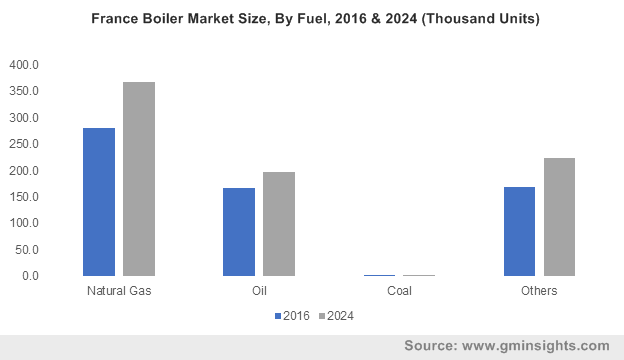Europe boiler market to generate substantial revenue from gas-fired product sales, retrofitting of conventional boilers with upgraded versions to stimulate the industry growth over 2017-2024
Publisher : Fractovia | Published Date : 2018-05-23Request Sample
As the world battles with the aftermath of climate change, Europe boiler market has been gaining robust traction in the energy circles with the rising significance of energy conservation in the region. The European Union, in order to meet the 2020 and 2030 climate change goals, has brought forth a plethora of changes in its legislative framework as well, given that heating and cooling consume half of the energy generated in the continent. In the midst of scrambling to undertake an effective initiative to bring about a change in terms of technology and fuel used for heating, Europe boiler market has become one of the focal points of action for the European Union lately.
France Boiler Market Size, By Fuel, 2016 & 2024 (Thousand Units)

While traditional boilers are still being questioned regarding their energy efficiency, the emergence of technologically advanced boilers like condensing boilers and hydrogen boilers have added a new growth dimension to the revenue graph of Europe boiler industry. Furthermore, the task of retrofitting older boilers to increase their energy efficiency for meeting EU standards is also on a high in the region, augmenting Europe boiler market trends.
As per statistics compiled by the European Environmental Bureau in 2015, new energy standards had been implemented by the EU for home boilers, that are expected to take on an equivalent of 47 Fukushima-type nuclear power stations offline in Europe by 2020. Post the launch of new standards, only home gas and water boilers using energy efficient condensation technology were allowed to be sold in Europe. According to the standard, older boilers also need to be upgraded to be in line with the new technology. A plan of this stature had been undertaken to make sure that anyone replacing an old boiler will be using a condensation boiler in its place, that is typically 50% more efficient than the ones more prevalent in European homes at present. The introduction of these standards depicts that Europe boiler industry is very stringently controlled by a regulatory frame of reference.
Incidentally, condensation boilers are about €1,000 costlier than the current residential boilers, but the additional cost is being viewed as an investment that will be paid back within 3 to 5 years in the form of energy savings that consumers can have with the use of a more energy efficient boiler. In fact, estimates show that the average household can be saving up to €480 on average by 2020 in the form of reduced energy bills. According to the European Environmental Bureau 6.6 million boilers are sold in Europe every year. With the implementation of environmentally conscious legislations such as the Ecodesign standard, Europe boiler market will also receive a commendable boost as boilers join the line of ecofriendly heating systems.
Europe boiler market has been largely captured by oil and gas boilers. Given that natural gas is relatively cheap in the continent, Europe boiler market size from gas-fired product sales is expected to exceed 3.5 million annual installations by 2024. In the ensuing years however, other ecofriendly technologies are expected to overtake gas and oil-fired boilers subject to governmental policies and incentive programs. Driven by low carbon heating solutions becoming increasingly competitive with traditional boilers and a favorable trend created by a positive policy framework, condensing boiler market is expected to be at par with the traditional boiler market.
Countries like Italy and Germany have been hailed for their efforts in bringing more ecofriendly heating solutions to Europe boiler industry. A firm in Italy has in fact developed a project which uses a condensation boiler based on a catalytic hydrogen burner to produce heat power. The merit of the system lies in the fact that it is a zero-emission system that uses hydrogen and atmospheric air as fuel, combining hydrogen and oxygen in a catalytic reaction to produce heat and steam. Electricity from solar panels on the roof is used to produce and store hydrogen required by the boiler.
Powered by the improvements in building standards and new legislations, consumer energy demands have now reduced for a while. Companies have been constantly inventing modern boilers with progressive design and technology, endowed with advanced controls, easy integration into existing boiler systems, lower energy usage and efficient heating. In conjunction with the rising number of boiler retrofitting projects, these pointers contribute majorly toward impelling Europe boiler market.
Similar to how conventional boilers are designed to fit into narrow hallways and small elevators, modern boilers are being deigned to fit into tight spaces. Suitable installers can bring in one section at a time when the complete boiler assembly is too large for the entryway. With the heat sector being covered in the EU Renewable Energy Directive, eco friendly heating systems and renewable technologies are being used in tandem with traditional boilers to reign in emission and climate change, driving Europe boiler market.